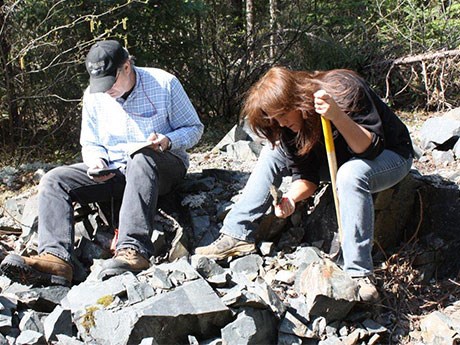Cynthia Le Sueur-Aquin doesn't view herself as an inspirational role model for women.
If there is a gender imbalance in today's mining industry, the president and CEO of Laurion Mineral Exploration admits she doesn't devote much time to thinking about it.
“I encounter many women in the field as geologists, and I respect them greatly, but I don't know how I can be a mentor.”
In her mind, the gender issue never enters the picture despite some tough personal experiences early in her professional life.
Her 35-year career has involved every facet of running mining companies - from project financing to property acquisition, corporate legal work, handling negotiations and investor relations.
Laurion is a junior mining company operating in the Beardmore area, 220 kilometres northeast of Thunder Bay. Le Sueur-Aquin's focus these days is on raising money to build a gold and base metals resource around the old Sturgeon River gold mine and its flagship Ishkoday property.
“I'm far too busy trying to get through the issues of the market and exploration to even think about how to mentor someone coming through the ranks.”
The South African-born Le Sueur-Aquin emerged from the hard-knock world of that country's gold mining industry. It was during the apartheid era when some parts of society staunchly believed that a woman's place was in the home.
The deep gold mines weren't the most hospitable place for a young female mining engineer. Until 1991, women were prohibited from going underground.
There were no latrines for women and the intense heat in working at depths of 3,000 to 4,000 metres could challenge anyone's physical stamina.
The workforce was a cultural mix of tribes and migrant workers, some harbouring the belief that women underground were bad luck.
“You have to understand, the South African mining industry is a subset of a very sociologically complex society,” said Le Sueur-Aquin.
Though never disrespected by black miners, it was the less-educated Afrikaners who gave her the most grief. “They hated to see a woman drive a car or come underground.”
Inside the three-decker service cages at the large mines, it wasn't uncommon for management types to be urinated on by the miners above.
In one instance, a forklift operator, who neglected the right-of-way rules, drove his forks through the windows of the company car she was driving.
“I was so shocked at the time. They could get away with murder and say, sorry it was an accident.”
Another time, Le Sueur-Aquin was called to surface and the hoist operator dropped a counterweight that bounced her helmeted head off the top of the cage she was riding.
“I knew that was on purpose because the joke was out over the next couple of days.”
Instead of letting her white-hot temper get the best of her, she developed a thicker skin.
Reliving those experiences is not something she dwells on.
“I never sat down and cried into my soup and said, ‘Poor me I'm a woman.’ When you're in what you recognize as a male-dominated industry, abuse will occur. It's how you manage it.”
That steely focus is what eventually propelled her into the leadership of Davidson Tisdale, one of the oldest listed mining companies on the TSX Venture Exchange.
She arrived in 2003 with a monumental task to clean up the company's debt and get it back on solid footing again.
Le Sueur-Aquin believes the physical aspects of some mining jobs may limit opportunities for women, but they shouldn't be prevented from applying for them.
She finds women can make far more significant contributions in support roles such as hoist and heavy equipment operators, and especially in the boardroom.
The women who inspire her are Cynthia Carroll, CEO of Anglo American (“my absolute hero”); Debra Valentine, Rio Tinto's head of legal affairs; Sika Resources' CEO Kim Harris, and Zoe Yujnovich, president and CEO of the Iron Ore Company of Canada.
If she were to see herself as mentor, it would be to provide Aboriginal people with an invitation to fully participate in the industry.
“I would like to see the mining industry being able to mentor the communities in our area through government programs in getting people to train on our projects. I want to see them develop and have opportunities, not just women. There's a bigger picture there.”



.jpg;w=120;h=80;mode=crop)